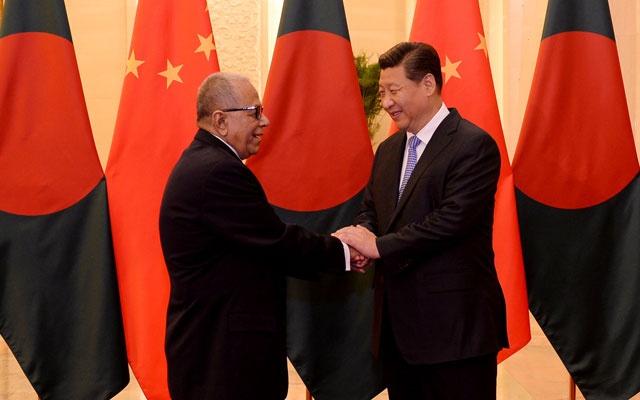Sarwar Jahan Chowdhury
In this process, the visit of Chinese president Xi Jinping is one of the most significant events in the diplomatic and geo-political history of Bangladesh. For last couple of decades the position of the President has become the most significant in China, ahead of the General Secretary of the Communist Party. However, the Chinese have devised a way where both positions are normally held by the same person, who in turn becomes the most powerful political figure in the Chinese system. This visit is, hence, the first of its kind in reality, despite the visit of a Chinese President in 1986 and a Premier in the early years of this decade. The visit of such a high profile global figure from China to Bangladesh signifies the kind of importance China nowadays attaches to Bangladesh.
The current Prime Minister, quite intelligently, undertook the initiative of ice-breaking between the Awami League and the Chinese leadership while she was the leader of the opposition, and the Chinese reciprocated wholeheartedly. It was in the context of a perceived coldness emanating from 1971 and the seventies. It was a fitting and timely initiative given the reality of economic miracles being achieve by China and the secular and, still to a great extent, pro-commoners nature of the Chinese state. Perhaps, China can’t anymore be termed as a communist republic in the classical sense, in light of its spectacular economic rise driven by Special Economic Zones initially in the early eighties and domestic private entrepreneurships later. Now both the governments share the same global anti-terror platform too.
It hardly requires a mention that China is almost a global superpower now. In economic terms, it already is; militarily, perhaps a superpower in waiting. But already China is very much a continental power in all senses. However, coping rightly with China’s largely peaceful rise to the stature of a major power is a delicate job in the geo-political sphere of Asia, especially in the Indian Ocean maritime domain, where there are other established and aspiring powers. The US is still the dominant military force globally and in the Indian Ocean.
After the fall of the communist bloc in early nineties and with the metamorphosis of China into a mixed ideology state, there has slowly been a paradigm shift in international politics. Geo-politics was and still is in a flux with the absence of cold war like ideological alignments. National security and economic interest have come in the forefront. Therefore, we can see economic cooperation, for example, between the US and China and also India and China despite some disputes among them in terms of geo-politics and other bilateral relations.
We have no dispute with China and hence Bangladesh-China relations can grow almost unrestricted. However, the reality is Bangladesh is surrounded by India from three sides. Parts of northern, eastern and north-eastern India, along with us, are part of the same Ganges-Bramhaputra basin of the contiguous plains in which India is the upper riparian state. India is still the second largest trading partner of Bangladesh, after China recently replaced it for the top spot. Also the cultural similarity, common history and India’s help during the liberation war of Bangladesh have encouraged reestablishment of the special Bangladesh-India relations in recent times. India’s support in the anti-terror stand of Bangladesh and non-interference in the war crime trials have boosted relations. Bangladesh and US also share the same anti-terror ground and the US is a major destination of Bangladeshi exports.
However, despite the good state to state relations the rise of the right wing Hindutva political forces have created some unease among the liberal political forces of Bangladesh. Domestically such forces have used anti-Bangladeshi rhetoric during elections especially in the Indian states neighbouring Bangladesh. In South Asian context, Bangladesh’s support for India in the Indo-Pak acrimony is quite useful for India diplomatically. But Bangladesh should be careful about becoming too close in rhetoric to the right wing forces which are becoming very strong in India. Since they harass and persecute Muslim minorities and raises anti-Bangladesh slogans in eastern states of India, a distancing from them is positive for Bangladesh.
Ensuring some security balance is necessary. With the “Islamic world” falling apart and the US taking lesser interest in regional matters of South Asia what’s our safeguard, if say, the hawks take over ruling BJP completely? While we don’t need to make it a public discourse issue now and create a self-fulfilling prophecy in this part of south Asia, yet we should also be careful not to put all our eggs in the same basket.
We need Chinese friendship to counteract such potential threats. China, on the other hand, needs alternate access to the Indian Ocean for trade and energy supply purposes. In fact India itself is part of BCIM initiative which is very much in line with China’s ‘one belt one road’ economic connectivity agenda. China also wants to dish out the labour intensive manufacturing of its private entrepreneurs to countries with cheaper labour e.g. Bangladesh, as it has already reached mid-income status and looking to climb up the value chain. All these make a case for some genuine alliance between Bangladesh and China. China has a stable vision for Asia and we perfectly fit into it. We shall surely not discard India or the US, neither should we get tied in their disputes.
Understanding the geo-political nuances and how our and the region’s fair and legitimate interest play out in this is imperative. Also crucial are maintenance of a fine balance and having geo-political farsightedness. We hope our policy and decision makers have the proper insight of all these complexities.
Sarwar Jahan Chowdhury is a freelance commentator on politics, international relations and society. He is a former military officer and currently working for BRAC Institute of Governance and Development. (Disclaimer: Opinion expressed in this article is of the writer’s own and it doesn’t necessarily reflect the opinion of his work institute)
Source: bdnews24










